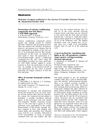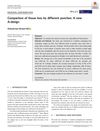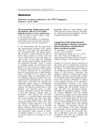 19 citations,
August 2007 in “Seminars in Plastic Surgery”
19 citations,
August 2007 in “Seminars in Plastic Surgery” Newer skin resurfacing lasers reduce damage and scarring, with some approved for safe use and minimal side effects.

Hair transplants now look natural and work well for hair loss.
 July 2023 in “Skin health and disease”
July 2023 in “Skin health and disease” Most UK survey participants had negative side effects from botulinum toxin injections, with many not fully recovering physically, emotionally, or financially.
4 citations,
January 2015 in “PubMed” The hair fiber filler product increased satisfaction and improved quality of life for people with thinning hair.
39 citations,
July 2005 in “Current medical research and opinion” Topical cream eflornithine 11.5% can slow hair growth and may help reduce hair removal frequency.
 1 citations,
March 2022 in “Hair transplant forum international”
1 citations,
March 2022 in “Hair transplant forum international” Hair cell cloning could potentially rejuvenate shrinking hair follicles, allowing for lifelong hair maintenance.
January 2010 in “Elsevier eBooks” Hair color is important in many fields and is measured for various purposes.
25 citations,
January 1999 in “Journal of cutaneous laser therapy” Diode laser effectively treats pseudofolliculitis barbae.
 3 citations,
May 2008 in “Hair transplant forum international”
3 citations,
May 2008 in “Hair transplant forum international” Common hair loss disorders may not need stem cell therapy, but could benefit from other treatments like hair cycle control and immune restoration therapy.
 1 citations,
January 2022 in “Stem cell biology and regenerative medicine”
1 citations,
January 2022 in “Stem cell biology and regenerative medicine” New treatments are needed for hair loss, and cell therapies might reverse hair thinning.
36 citations,
August 2012 in “Dermatology online journal” Using wigs, hairpieces, and sprays can help people with hair loss feel better about themselves.
 7 citations,
September 2018 in “Aesthetic surgery journal”
7 citations,
September 2018 in “Aesthetic surgery journal” Deoxycholic acid effectively reduces double chin fat with temporary side effects and high patient satisfaction.
 108 citations,
December 2003 in “Lasers in surgery and medicine”
108 citations,
December 2003 in “Lasers in surgery and medicine” ICG-enhanced NIR laser therapy may be a promising acne treatment with improvement and no side effects.
 26 citations,
May 2017 in “Lasers in Medical Science”
26 citations,
May 2017 in “Lasers in Medical Science” Laser therapy and hair growth factors significantly improve hair density in male baldness.
 3 citations,
April 2019 in “Journal of Dermatological Treatment”
3 citations,
April 2019 in “Journal of Dermatological Treatment” Caffeine shows promise for treating some types of hair loss, but more research is needed.

Afro-textured hair is more fragile and prone to certain scalp conditions, requiring careful treatment and more research for effective management.
 11 citations,
January 2006 in “International Journal of Cosmetic Science”
11 citations,
January 2006 in “International Journal of Cosmetic Science” Some oils can penetrate hair and reduce the stickiness between fibers, but mineral oil cannot.
 September 2010 in “Companion Animal”
September 2010 in “Companion Animal” The guide explains how to diagnose and treat hair loss in dogs, covering causes and treatments, with some conditions lacking treatment options.
 55 citations,
September 2017 in “Journal of Cosmetic Dermatology”
55 citations,
September 2017 in “Journal of Cosmetic Dermatology” Platelet-rich plasma, taken from a person's own blood, can help rejuvenate skin, stimulate hair growth, and treat hair loss, but more research is needed to confirm its safety and effectiveness.
 47 citations,
January 2013 in “International Journal of Cosmetic Science”
47 citations,
January 2013 in “International Journal of Cosmetic Science” Hair diversity is influenced by complex genetics and environmental factors, requiring more research for practical solutions.
 10 citations,
June 2019 in “International Journal of Cosmetic Science”
10 citations,
June 2019 in “International Journal of Cosmetic Science” Some plant-based chemicals may help with hair growth, but more research is needed to confirm their effectiveness.
 7 citations,
September 2020 in “Journal of Cosmetic Dermatology”
7 citations,
September 2020 in “Journal of Cosmetic Dermatology” Serum biomarkers like insulin-like growth factor-1 and vitamin D may help diagnose androgenetic alopecia.
 4 citations,
February 2020 in “Journal of Cosmetic Dermatology”
4 citations,
February 2020 in “Journal of Cosmetic Dermatology” Synthetic hair implants can cause severe scalp problems and removing them improves conditions; natural hair transplants are safer and more effective.
 4 citations,
June 2018 in “Journal of Cosmetic Dermatology”
4 citations,
June 2018 in “Journal of Cosmetic Dermatology” The new A-design punch for hair restoration surgery may lead to smaller scars compared to other types.
 2 citations,
September 2004 in “International Journal of Cosmetic Science”
2 citations,
September 2004 in “International Journal of Cosmetic Science” Hair quality is genetically determined and linked to its composition and strength.
 1 citations,
March 2019 in “International Journal of Cosmetic Science”
1 citations,
March 2019 in “International Journal of Cosmetic Science” The model predicts hair breakage based on key hair properties and helps product developers.
 June 2018 in “Advances in Cosmetic Surgery”
June 2018 in “Advances in Cosmetic Surgery” Hair loss caused by genetics and hormones; more research needed for treatments.
 21 citations,
April 2019 in “Clinical, cosmetic and investigational dermatology”
21 citations,
April 2019 in “Clinical, cosmetic and investigational dermatology” The document concludes that stopping shaving or removing affected hair can alleviate Pseudofolliculitis barbae (PFB).
 January 2017 in “Clinical approaches and procedures in cosmetic dermatology”
January 2017 in “Clinical approaches and procedures in cosmetic dermatology” Anti-glycation treatments might slow skin aging, but more research is needed.
81 citations,
January 2003 in “Journal of cosmetic and laser therapy” New techniques have improved acne scar treatment, but multiple tailored sessions are often needed.
























